11th May 2023
The Spokesmen Cycling Podcast
EPISODE 327: LTN Bollards Have Not Created Jesmond Ghetto: In Conversation With Dr. Tony Waterston
SPONSOR: Tern Bicycles
HOST: Carlton Reid
GUEST: Dr. Tony Waterston
TOPICS: Jesmond’s LTNs discussed on the Tour de Jesmond family-friendly bike ride
TRANSCRIPT
Carlton Reid 0:12
Welcome to Episode 327 of the Spokesmen cycling podcast. This show was engineered on Thursday, the 11th of May 2023.
David Bernstein 0:28
The Spokesmen cycling roundtable podcast is brought to you by Tern bicycles. The good people at Tern are committed to building bikes that are useful enough to ride every day, and dependable enough to carry the people you love. In other words, they make the kind of bikes that they want to ride. Tern has e-bikes for every type of rider, whether you’re commuting, taking your kids to school or even carrying another adult, visit www.ternbicycles.com. That’s t e r n bicycles.com to learn more.
Carlton Reid 1:04
Hi I’m Carlton Reid and welcome to a hyper-local edition of the Spokesmen. This podcast is normally international in scope but today I’m riding on my home patch with Tony Waterson, a retired consultant paediatrician. I joined him on the Tour de Jesmond, an annual family-friendly bike ride around the streets of this leafy suburb in the northern English city of Newcastle on Tyne. Back in March, with only a little forewarning, the local council blocked some residential roads to through motor traffic by installing a bunch of bollards, creating a low traffic neighbourhood in East Jesmond. The creation of an LTN in the neighbouring suburb of Heaton attracted almost no negativity but there’s been an uproar in Jesmond. There have been two roadside demos against the East Jesmond LTN and later in the show l include audio of some of the objections raised by folks who live here. There has also been vandalism of measuring equipment and a private Facebook group quickly amassed a membership of 700 often very angry residents. Those opposed to the LTNs include a smattering of 5G conspiracy theorists, chemtrails believers and anti-vax folks, much to the annoyance of those residents who simply want the bollards to disappear and who hold no truck with those who claim that Jesmond is set to become a 15-minute-city concentration camp. I’m not exaggerating here, One media article, in all seriousness, claimed in a headline that the LTN had led to the ghettoization and sterilisation of Jesmond. Dear listener, it hasn’t. I talk about these contentious issues with Tony, who’s part of a group of local child health professionals calling on the council to stand firm. We also discuss the local elections, where the LTN issue probably caused the ousting of a Labour councillor, replaced with a Lib Dem who campaigned on a rip-out-the-bollards ticket. Be aware there’s some loud road noise soon after we start pedalling because we were riding next to the busy Great North Road; the thrum soon fades away as we’re led around quieter streets.
Tony, how many do you normally get on this ride?
Tony Waterston 4:08
I would reckon this is about 50% more than usual. We’re usually I think 20 is about the usual. Okay, this is a big one. We don’t usually have so many children, we usually have two children.
Carlton Reid 4:19
Right.
Tony Waterston 4:19
So this is a lot better than usual. And I’m very pleased.
Carlton Reid 4:22
So this is a tour of Jesmond, but you’re getting to a fair bit of not Jesmond.
Tony Waterston 4:28
Well, that’s because we pretty well, we’ve pretty well done Jesmond in the past few years. So but it is beginning and finishing there. But we do sometimes go a little bit into neighbouring areas. But it’s starting here. Always start here and go through a bit of Jesmond in it
Carlton Reid 4:45
Tony, you said your your intro speech that you said we’re ending in a controversial area. The LTNs which is controversial, not to us. Yeah, but controversial to certain people. Who believe we should rip the bollards out. So we’ll just had a local election. Where the Lib Dems, in effect said that’s what they wanted to do they want to rip out the bollards. Do you think that’s gonna? Are they going to carry on doing that, do you think? Are they’re gonna stick to their promises and keep on asking to rip them out?
Tony Waterston 5:20
I think they’re, it’s very interesting because they’re saying two contradictory things, which is that they like and approve and want to have LTN. But think the whole, this whole thing is dumb and they want to start again. And I don’t think those two statements are reconcilable. So I think they’ve done that for political reasons.
Carlton Reid 5:43
So, kind of traditional. Well, sitting on the fence saying different things to different people.
Tony Waterston 5:50
Well, I think it’s, I think it’s a bit sad, really, but it has got them elected. So I think what they’re what they’re, what they’re going to have to do is to try and amend the scheme. I don’t see how it’s possible for two councillors to have it all pulled out.
Carlton Reid 6:07
Well, that they’re lib dems, not a majority council.
Tony Waterston 6:08
Yeah, exactly. Exactly. So we’re going to meet them actually to talk about how you might get some members of the community more members in the community behind them. But what kinds of compromises might be possible that will actually help to resolve the difficulties in the community? So but I think it’s going to be very hard for them to actually do something that is actually because the way people,
Carlton Reid 6:42
Jesmond, North Jesmond, is almost by my reckoning, the only ward in the country that has actually done what lots of people have threatening to do, which is vote out councillors who are in favour LTNst. Whereas nationally, the Lib Dems have been incredibly supportive of LTN in many cities. And they’ve been voted in on that ticket. So north Jesmond is, is an outlier. Why do you think why do you think Jesmond is an outlier, nationally?
Tony Waterston 7:18
Well, I think that’s a hard one. But I think the the labour councillors have made themselves very unpopular with that community. It’s always been a marginal seat. They did. There’s been alternating between Lib Dem and Labour for a while. But I think Labour’s very unpopular, because of the LTN. But also from previous schemes. They’re seen as perfidious. So you may wonder how they were voted before because obviously a strongLabour group. Yes. But I think this has become the focus. The council has become the focus of this latest
Carlton Reid 7:59
It would be fair to say that, that there was a massive swing, massive swing, I guess, in marginal I agree. But then there is this massive swing to the Lib Dems. How would how much of that do you think was the LTN? A great part?
Tony Waterston 8:14
I think it probably was, it’s difficult to see what other issues there are, really are open to this extent because I mean, there are plenty of other issues. There was antisocial behaviour, students, bins, but these are the same everywhere. It’s difficult to see any other issue that’s really divided the community to this extent, we did have a previous one we had Acorn Road, which also led to this kind of business. And so I think it’s people remember that as well, possibly, and hold it against the council. So I can’t see there being another issue that would have been so.
Carlton Reid 8:57
So I’ve been doing shock horror, this one, Tony, but I’ve been going recently for some a whole host of different reasons. I’ve actually been using a car to go through Jesmond Road, roads, that people are saying, you know, now totally blocked because of the LTN as though it was never blocked before. Yeah. But all the times I’ve been going through I mean, I went through deliberately once at peak time. Yeah, to see what people were complaining about. And yes, you probably put 10 minutes on the journey. But then just an hour away from peak and you pretty much get through those those troublesome junctions almost straight away. So we are talking about a problem that’s maybe an hour, two hours tops per day. So is that an argument for saying Well, look, yes, there is a potential problem at peak. And what do we do about that problem? And clearly people are suffering. They say they’re suffering enormously. For, for not being able to get through.
Tony Waterston 10:09
Yeah. Well, I think there are three things that could be done. But are real, real, genuine issues. And one is the right turning lane off of Jesmond road to get into Osborne Road, which could be improved. And the council has already said it’s going to improve it. The second is buses, bus services, not very easy. And I think there’s a real concern about all the people who haven’t used the bike, don’t really feel are up to using a bike again, might have a mile to walk, don’t want to really have to be in a car to go around a long way. But really they should be there should be recognition of that. And then at the council obviously finds a different, it’s difficult for the council to do that. But I think that’s an issue is improving public transport. That’s its should really been done before. The third one is the businesses who we don’t know. I mean, I haven’t seen any data on the impact of LTNs on businesses. And I think it’s usually said that more people walking and cycling will be good for business. Yes, but the businesses are very afraid and anxious. So I think something needs to be done. And the council has also said they will do that. The Cradlewell, to make it a more pleasant area. So that the width will show show the businesses that something is being done. And I think probably there should be a bit more data collected, actually, to see you using those businesses. Yeah, using using the usual kind of
Carlton Reid 11:49
Of course people can get to these businesses in the same way they can get before Yeah, we’re where we are right now is on the Great North Road that we’re getting here. All this massive traffic noise. And we’re going into Jesmond here now. So that’s clearly one of the boundary roads near the LTNs. But that’s always been busy. And Jesmond Road always been busy. But these are not. These haven’t been created by the LTN have they?
Tony Waterston 12:14
No. But I think the point, the point is we don’t know whether the main, they have a real fear. You know, the fear may be completely false. We don’t, we don’t know. And I think they’re so I think we’re attempting to reassure them without really knowing what the impact is, is I think they need to be taken seriously rather than just say, Oh, well, it’ll be alright.
Carlton Reid 12:38
So you’ve been a bit of a lightning rod with your role as a former consultant paediatrician and you have written a kind of an open letter on the LTNs, I mean, who was that open letter to. just just literally everybody?
Tony Waterston 12:54
It was really to the pres, all the candidates and the council. It was really to to highlight the the health issues, which are an important part of this. And I think this group of of health professionals has been anxious about this for quite a while and actually had a really ever since this group was set up, which is a national group over the COP26. And did this cycle, I think, and you were on it. That was amazing. It was an amazing event. And that led to really this group of people here in Newcastle feeling that they need to continue to publicise this.
Carlton Reid 13:41
So these are northeast. I mean, they looked at like mainly paediatricians.
Tony Waterston 13:46
All child health.
Carlton Reid 13:47
It’s all child health. And that you wouldn’t one would think would have resonance? You know, we are talking about children’s lungs. Yeah. So do you think your letter in the, in the local newspaper, you’ve had the antis and then you’ve had, you know, this statement that the local childrens’ health headline doesn’t really portray it very well to about you know, conflict, gridlock, etc, etc. And whereas your your statement is, is child health? Yeah. So do you see any of that argument which you’ve, you’ve put forward having resonance?
Tony Waterston 14:29
Well, I think it needs not on one occasion, and to continually be be put, because I think it’s like always with local issues. The bigger picture gets lost in the in the local issues, and in particular, the individual issues for individual people. And they say everybody thinks, Well, my action doesn’t cause pollution. It’s everybody else that does it. It’s because everybody else is driving all the time. So they probably will want other people to stop and not necessarily themselves. But on the other hand, I think it will have an impact. You know, if it’s a drip by drip thing.
Carlton Reid 14:32
We have some very loud people who put their point of view but we don’t even the local actions and wasn’t actually that many people voted. Okay. It was a big swing, but it wasn’t like every single person in Jesmond by any means. So the loud people, do you think they are perhaps not actually representative of the population as a whole, but they’re just very loud. And we hear about them when we see them in the press?
Tony Waterston 15:30
Oh, that’s definitely the case. I think that’s definitely the case. And I think there is an overlap in these very loud ones with the awful group who were at the hustings, which was a very, quite a large group of climate denialists, who were conflating all this with the three minutes city conspiracy theory. So I think there’s a bit of crossover there.
Carlton Reid 15:53
Do you think that it’s actually will turn a lot of people off? So people who might have been consider it as moderates normally? And would have been opposed to the LTN see these conspiracy denialists or conspiracy theorists, climate denialists, anti 15 minutes cities, anti-LTN people and go, actually, I would have supported the anti LTN movement, but because those guys are there, I’m probably going to pull back? Do you think there’s an element of that?
Tony Waterston 16:21
I think so. I think so. And I think I think I think what I’ve always felt about this is that in six months or nine months time, you’ll find that the majority are accepting it. And quite happy, then the small minority remains a small minority are working against it. And I think it will help. I think that came up with the hustings and one person who was part of the resident’s group against it spoke up after this climate denial thing, saying, I’m not one of those, I believe in climate change.
Carlton Reid 16:54
However, I’m still willing to pollute still.
Tony Waterston 16:56
Yeah, exactly. Right. Exactly. But, but I think there’s this way also, there’s real concern they have, which is I think force also that it just displaces the pollution.
Carlton Reid 17:07
Yes, that was gonna be my next question. How do you address because that that is one of the key things is this is worsening climate change? Because you are worsening congestion on the boundary roads, you are then making more pollution. So this is why me as I’m saying, I’m gonna an anti LTN hear me. I am now causing more pollution. And I don’t want to but you are making me. So how do you address that? That argument?
Tony Waterston 17:40
I think it’s I think it’s data. I think they need to be data from the council of road traffic numbers in the surrounding areas and showing that they’re just they haven’t increased or they’re only increased at certain very short periods. And also looking at the pollution monitors, and seeing what they’re saying.
Carlton Reid 18:02
So I’ve looked at the data, because you can get real time data on the Coast Road. Yeah. Both pollution, air pollution and on traffic stats. Yeah. And nobody tends to believe you when you say this, but actually, last year, the traffic was six up to 62% up, probably post pandemic, this year we’re actually post LTN, we’re up to 6% down. But probably that’s across the whole day rather than being peak. So do you think any amount of data will actually shift people? Or is this data only really going to convince the council that they’re doing the right thing?
Tony Waterston 18:42
No. I think like you said before, there’s some people wouldn’t be convinced the majority, I think, well, and I think it needs to be the thing is, it’s not always easy to get information out to people, because people are very selective in what they read. So I would hope that the council would actually this is where they need to really get going with some local information flow, possibly through people’s doors.
Carlton Reid 19:11
Do you think there’s been enough consultation? Because again, that’s one of the things that, you know, we want consultation, we know what that means. It tends to mean, we actually want to rip these out. Yeah. And you know, if you give us a consultation that will ask for the veto is what they’re actually after. But do you think there has been some mistakes made?
Tony Waterston 19:30
Yes, I think so. I think I think you have to admit that there were. And I got some ideas about how it could be done. And in fact, after, after the Acorn Road business, the JRA which I was chair of them, the Jesmond Residents’ Association did put out a report on the consultation process. But basically, I think that I think it’s never going to be possible under the present circumstances of democracy to do have local local consultations because a lot of people don’t use the media that the council puts out information. So the best way probably would have been to put them through the doors. If they did 3500. They said, a lot of people say always say they didn’t receive. So, and I personally did put on arrange a meeting at the library at least a year ago, about the LTN that had about 15 people at it. So it’s it’s difficult to get information out and people will always say they didn’t see it. Probably should have been more local meetings.
Carlton Reid 20:40
We have varied, me and you and a bunch of other people who were actually on this ride. And other people who were anti measures for streets for people. And we’ve been on various panels. Yeah, I think it’s since 2016. Yeah. So the fact that people are saying has been no consultation, the council has been talking to people and getting their opinions for a number of years. Probably even before 2016. So when you when you quiz people about that, they say, Ah, okay, the counters only consulted special people only consulted the pros. Do you see any validity in that argument?
Tony Waterston 21:21
Well, I think that people this is back to a general concern about people being unaware of what goes on and local democracy. And for example, there used to be group constants used to have four meetings a year in local areas. And they stopped those completely now. And also city, City Life [newspaper] is less frequent. And they’re also used to be Jesmond Residents’ Association newsletter, which is also stopped. So I think the channels have got less, and I think people feel less connected, generally with local democracy. So these are excuses. But I think I think that the council probably needed to have recognised that they needed to be a special effort to either do letters to doors, or to have local meetings.
Carlton Reid 22:10
As we have seen the most effective thing to do is actually put the bollards in. Because you can do any number of consultations prior to this, and it’s all airy fairy. Bollard goes in, and then all hell yeah, send it back. That’s what the trials were for, you know? Yeah, we’ve got to do these to actually see what it’s really like.
Tony Waterston 22:31
I know. But I agree. But I think the risk is that, if the opposite is, if the opposition is very enormous, then they do feel they have to do something about taking it out, which will be disastrous. And I think in future, we need to use a more representative democracy system, such as the citizens’ jury or citizens’ assembly, when you’ve got a very contentious issue that we
Carlton Reid 22:54
We did have that we had a bunch of people, the city, employed people to talk to residents, about their concerns and come up with ideas. And they brought in experts in who took those concerns. So that was us. It was a small citizens assembly.
Tony Waterston 23:10
They weren’t was there wasn’t there an attempt to get the local population representatives involved in what was happening? I think we don’t have a good system at the moment. It needs to be improved. And I think there needs to be some experimentation with
Carlton Reid 23:27
Are you know, kind of calling for what many people are, in fact, calling for Swiss-style, canton-style referendums?
Tony Waterston 23:35
No, I don’t think referendums are good, either. Because it’s not a yes or no issue. But I think generally, people need accurate information, to help them to decide, can be the needs to be a real effort to get the people involved, who are not normally participating in these discussions which is what a citizens’ assembly …,
Carlton Reid 23:57
But that’s what it has done. I mean, the bollards have got people talking, you really cannot escape the fact that that was literally in your face. Yeah. And it has, some people are going to be very anti, but many people are certainly on certain roads, which are now very quiet. Yeah, I know, previously, you know, awful roads to drive up or cycle or walk up there just to be nice. And in a few months time after the trial, people are gonna be just going actually, I’m not going to stop or put my head above the parapet and say I’m in favour of this because you’ll get screamed down. Yeah, but they’re gonna be in favour because it just it just obviously makes where they’re living nicer.
Tony Waterston 24:36
Yeah. Well, I think you and I agree on that. But it’s the it’s, I don’t think there’s much of a dialogue going on. I think it’s, it’s people shouting and not many people listening. And, and that’s not very good for a local area to have that kind of angry angriness. The, the level of anger has been extraordinary and I’ve tried a few times to get have been through a dialogue and haven’t managed to do that. Yes. A proper dialogue.
Carlton Reid 25:04
Yes, it has been very difficult. And I mean, one Facebook group, private group, 700 people, but only if you’re anti it, you can’t join if you’re not. And they’ve been slagging me off something rotten and I can’t do much about it
Tony Waterston 25:20
The things that have been said have been quite disgraceful, yes. And it’s really sad to see that happening. And the meetings that have been held haven’t been an opportunity to bring out the facts, because it needed to be meeting when all the facts were presented. And that hasn’t really happened to a general, to a general audience, and I think if you tried to do it, now, it will be very difficult that we’re gonna have to concentrate on getting across this.
Carlton Reid 25:48
We’re going to leave Tony there for a second, and hear from some of those opposed to the bollards. But first, here’s my colleague, David, with a short ad break.
David Bernstein 25:59
Hello, everyone. This is David from the Fredcast. And of course, the Spokesmen. And I’m here once again, to tell you that this podcast is brought to you by Tern bicycles, the good people at Tern build bikes that make it easier for you to replace car trips with bike trips. Part of that is being committed to designing useful bikes that are also fun to ride. But an even greater priority for Tern, is to make sure that your ride is safe, and worryfree. And that’s why turn works with industry leading third party testing labs like E FB, E, and builds its bikes around Bosch ebike systems, which are UL certified for both electric and fire safety. So before you even zip off on your Tern, fully loaded, and perhaps with a loved one behind, you can be sure that the bike has been tested to handle the extra stresses on the frame, and the rigours of the road. For more information, visit www.ternbicycles.com to learn more. And now, back to the Spokesmen.
Carlton Reid 27:08
Thanks, David. And as mentioned before the break, it’s time to hear from some of those residents who are very much opposed to the LTN. I caught up with them at the first roadside demo. And you can watch all of the interviews on a half hour YouTube film I made of the protest letting residents speak their minds. Llink in the show notes.
Jesmond anti-LTN 1 27:30
Just because they cut Jesmond in half. Any traffic wanting to go into town now is either gonna go one way or the other. And if they’re going from the other side of the bollards, then really they’ve got to go come out onto the Coast Road. And if they’re going, if they’re going south or potentially into the city via Sandyford Road, then they’re gonna go along Sandyford Road, whereas in the past, they would have come down here or longer.
Carlton Reid 27:58
But residents can get to every property in the in the street, yes?
Jesmond anti-LTN 1 28:04
I would have thought so, yeah.
Carlton Reid 28:05
So the things that have been stopped, the council would say, the Rat runs the people who don’t?
Jesmond anti-LTN 1 28:12
Well, they would say that they say they’re conducting a consultation, but in my view, it’s a window dressing exercise. They’ve decided what they want to do. They’re not really very interested in whether people want it or not. And they won’t be very interested in whether the people have objected to it or not.
Carlton Reid 28:29
Do you think any of that is caused by the LTN? Or is that something that might have existed beforehand?
Jesmond anti-LTN 2 28:35
Well, ccertainly traffic existed here beforehand. But anecdotally, I would say this traffic jam was two or three times as long as it normally is, at this time of the day. And that’s a direct result of the LTN.
Carlton Reid 28:47
Okay, what would you like the council to do? What what’s what’s what would be your idea?
Jesmond anti-LTN 2 28:52
I would like them to do what it says on the sign. Consultation, there was zero consultation about this LTN. The council will tell you otherwise, but there was not a consultation. Clearly some form of LTN might have some form of advantage. But this is draconian. And it’s ruining people’s lives.
Jesmond anti-LTN 3 29:11
And I just feel that I’m fenced in. I can’t move about, you know.
Carlton Reid 29:17
You’ve got grand …
And I’m presuming here that these are your grandchildren.
Jesmond anti-LTN 3 29:20
These are my grandchildren. They’ve got to go to school. So they live in Southeast Jesmond. The school is in West Jesmond. It’s about a mile walk, which is fine if you haven’t got anything else to do apart from just take the children to school and not go to work and do other things. And if the weather’s good, but if the weather’s going to be you know, it’s bad, it’d be horrendous, you know, I just feel kettled at the minute you know, I don’t want to rule the road in my car, I just want to participate in life in the community of Jesmond.
Carlton Reid 29:49
You say “kettled”, which which has the connotation of “I can’t physically get out.”
Jesmond anti-LTN 3 29:53
Wel, I can physically get out.
Jesmond anti-LTN 4 29:55
Simply because they’re channelling all the vehicles on the streets, so you get massive tailbacks. That means you’re getting more pollution, if you really believe that the combustion engine is really harmful, which Ie personally don’t.
Carlton Reid 30:07
You don’t believe that combustion?
Jesmond anti-LTN 4 and 5 30:08
No.
Carlton Reid 30:08
Would you put your mouth over that exhaust pipe on that car?
Jesmond anti-LTN 4 30:12
Of course not.
Carlton Reid 30:12
So it must be harmful then… Let’s get back to riding along with Tony Waterston.
Tony Waterston 30:19
Yeah. And the thing is, Carlton, that what worries me is it’s going to derail the future developments in Jesmond because there are plans underfoot for a low traffic street, or School Street, and also a low traffic neighbourhood in West Jesmond. So, and I’m afraid that one of the councillors said I think at the last meeting that when asked if there were any further plans, that not at the moment now,
Carlton Reid 30:52
Prior to the election, so election out of the way, they can probably be brave enough to do it. Yes.
Tony Waterston 30:58
Well, I hope so.
Carlton Reid 31:00
Because at the end of the day, the city council has got to improve air quality. It’s a legal requirement that failing. And one of the simplest and easiest ways of doing this is by reducing the amount of motor traffic which LTN’s don’t do that instantly? But all the data, all the scientific studies done to date seems to suggest that it certainly isn’t making things worse. And a lot of the claims that people are saying, you know, using anecdata, yeah, it’s just not panning out.
Tony Waterston 31:33
Yes, though. Well, I think that’s why the needs to be wider discussion, this comes back to climate change, really, with a bigger group and the community as to what measures need to be done to reduce emissions for the benefit of clean air and for the benefit of avoiding 1.5. Or keeping within 1.5, I should say, and I think a lot of people aren’t really, I think, haven’t thought about the methods that you can use to reduce motor traffic, and what’s realistic and what isn’t. And obviously, there are measures national government could make, which it’s not doing, and there are measures local government can take. And this is there seems to be one of the most used, that local government can can take. It’s quite difficult to actually bring in a stick that that works. So I think this this debate, it’s important for people to realise that this this is part of the bigger picture.
Carlton Reid 32:42
Thanks to Tony Waterston there and thanks to you for listening to Episode 327 of the Spokesman podcast brought to you in association with Tern bicycles. Shownotes and more can be found at the-spokesmen.com. The next episode out really very, very soon will be a chat with the BBC’ss Anna Holligan and Kate Vandy and the formation of their mobile, news gathering studio, the BBC bike bureau. Meanwhile, get out there and ride …
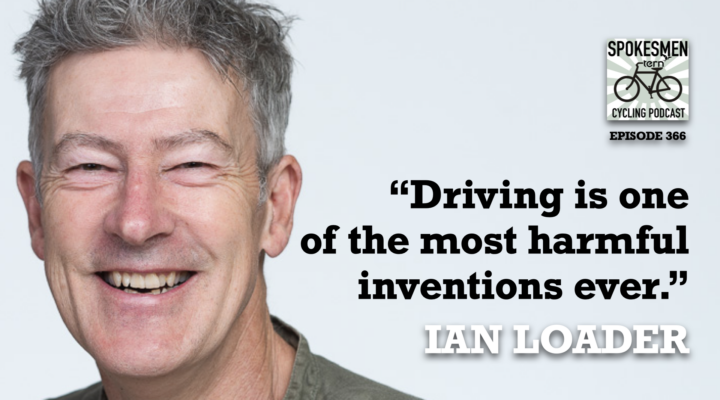
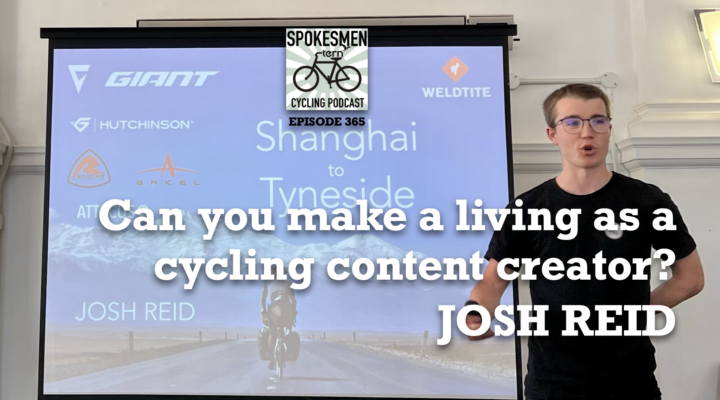
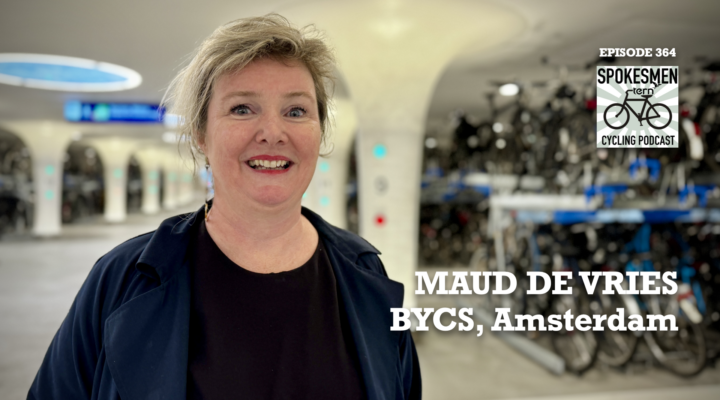
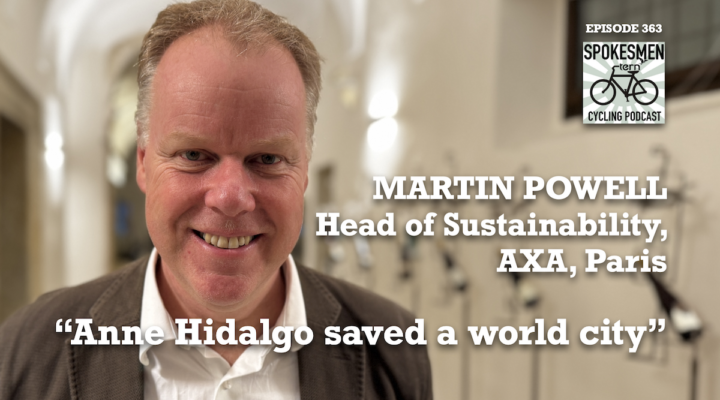
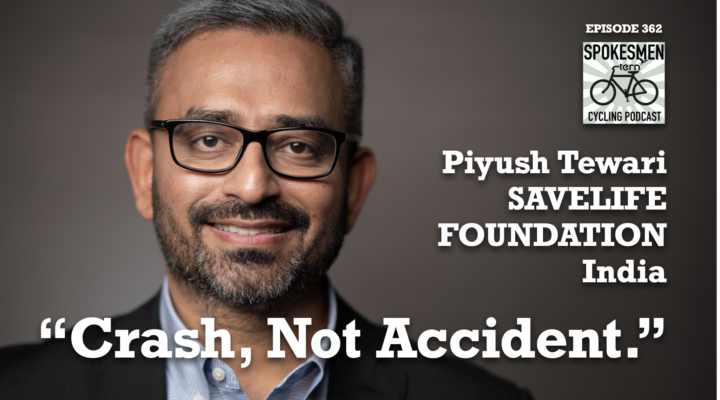
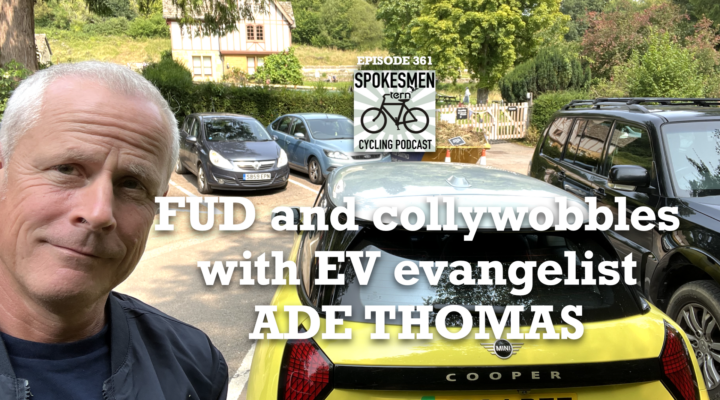
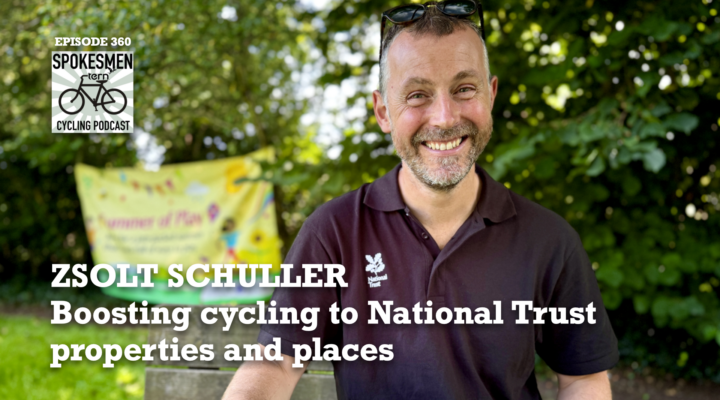
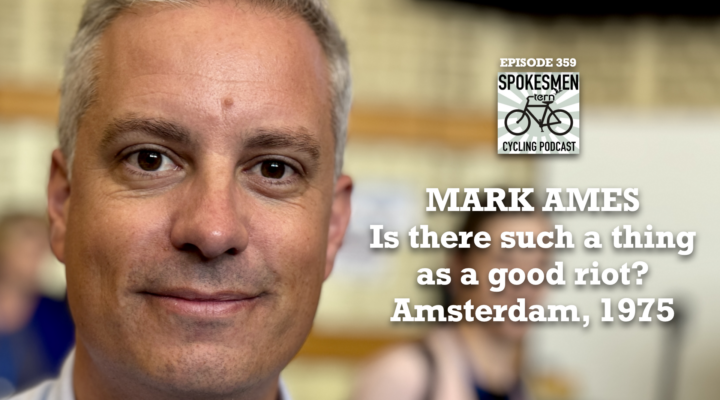
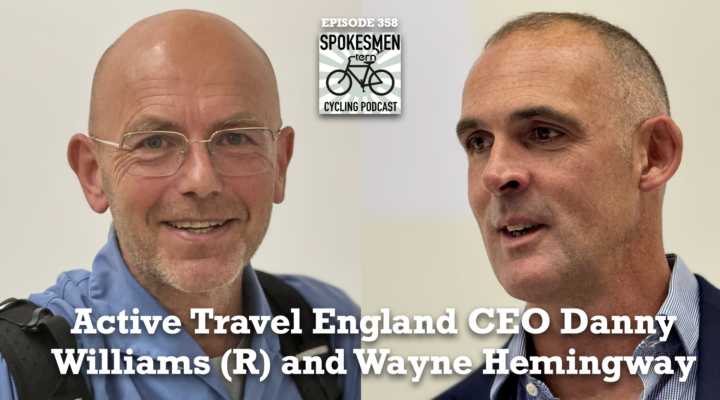
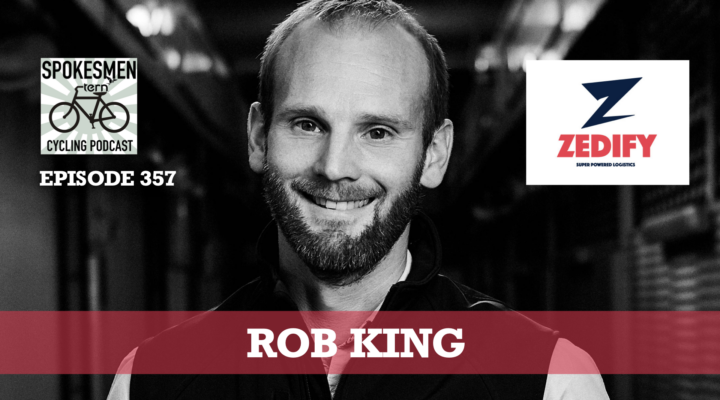
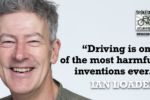

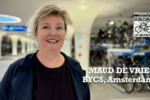
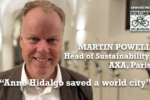
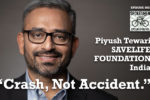
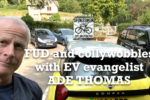

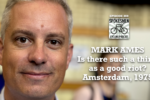
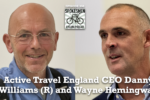
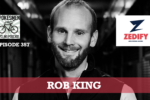
Be First to Comment